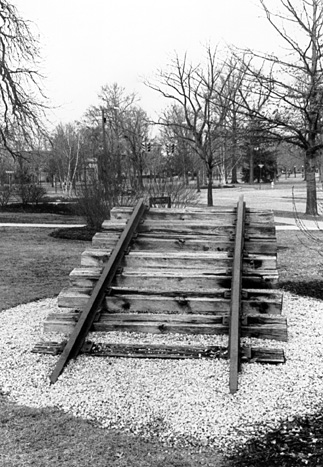
---------------G--------------
Lewis L. Rice.

---------------G--------------
Lewis L. Rice.
Lewis L. Rice edited The Lorain County News from March 1, 1864 until October, 1865. Mr. Rice was the only editor of The News during the Civil War that was never a student of Oberlin College (Williams Brothers, 65). He came to the paper with 42 years of experience in the business, managing and editing abolitionist newspapers (Williams Brothers, 66).
Rice's credits included editing The Ohio Star. He was the publisher and editor of The Cleveland Whig from August 20, 1834 until 1837. In January of 1835 Rice was joined by another veteran of the news business, R. Penniman. In 1836 Penniman and Rice began publishing The Cleveland Gazette, which later became The Cleveland Daily Gazette. They sold both The Whig and The Gazette to Charles Whittlesey and A.H. Lewis on January 3, 1837 (Encyclopedia of Cleveland History, 2nd Edition, Ed. David D. VanTassel and John J. Grabowski [Bloomington and Indianapolis, Indiana: Indiana University Press, 1996]). In 1939 Rice became the editor of the Painesville Telegraph (Emilius O. Randall and Daniel J. Ryan, History of Ohio: The Rise and Progress of An American State, vol. 3 [New York: The Century History Company, 1912] 401). L.L. Rice took over as the editor and publisher of The Ohio American which was an organ of the anti-slavery Liberty Party. He worked for The Ohio American from September 19, 1844 to August 28, 1845. In August the paper moved from Ohio City, just outside Cleveland, to Cleveland proper and the name was changed to The Cleveland American. Rice stayed with this paper until May 28, 1847 (Encyclopedia of Cleveland History). Lewis L. Rice, who was an attorney, also served as the private secretary to Ohio Governor Chase. After Rice edited The Lorain County News he moved to Columbus, Ohio where he served as the Superintendent of Public Printing for the state of Ohio during the next twelve years. Rice finally retired to Oberlin (Williams Brother, 66).
Rice should be most remembered in connection with the Spaulding papers. When Lewis Rice took over as editor of The Painesville Telegraph in 1839 he acquired many papers including the manuscript of Solomon Spaulding. Spaulding was one of the early Mormons. Some Christians who opposed the founding of this denomination speculated that the Book of Mormon was a plagiarism of Spauldings works. Spaulding's works had been missing for a number of years, therefore it was impossible to prove the plagiarism. Rice turned the papers over to James Fairchild, President of Oberlin College, when he realized their significance in 1884. Fairchild subsequently read the manuscript and discredited the charges of plagiarism leveled against the Book of Mormon in a speech in 1884. The Solomon Spaulding Manuscripts are now in the possession of Oberlin College. This work is considered by some to be part of the Book of Mormon (Randall and Ryan, 401-404).